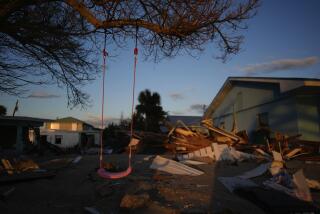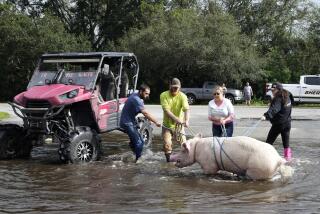An exasperating hunt for gasoline in Florida as Hurricane Irma’s evacuees scramble to come home

Hurricane Irma threw Florida into an epic gas crisis, turning the minor chore of filling up into what could feel like a fool’s errand. (Video by Carolyn Cole / Los Angeles Times)
Reporting from Gainesville, Fla. — The drive from Naples to Gainesville was 288 miles of gut-wrenching anxiety, and not because of destruction from the massive hurricane that tore through the day before.
Along that entire stretch of Interstate 75 — four hours from far southwest Florida to nearly the top of the state — there was hardly a functioning gas pump to be found.
Mile after mile, motorists were exiting the freeway on fumes and encountering the same sorry sight: empty gas pumps covered with yellow bags, or even worse, wrapped in the dreaded shrink wrap.
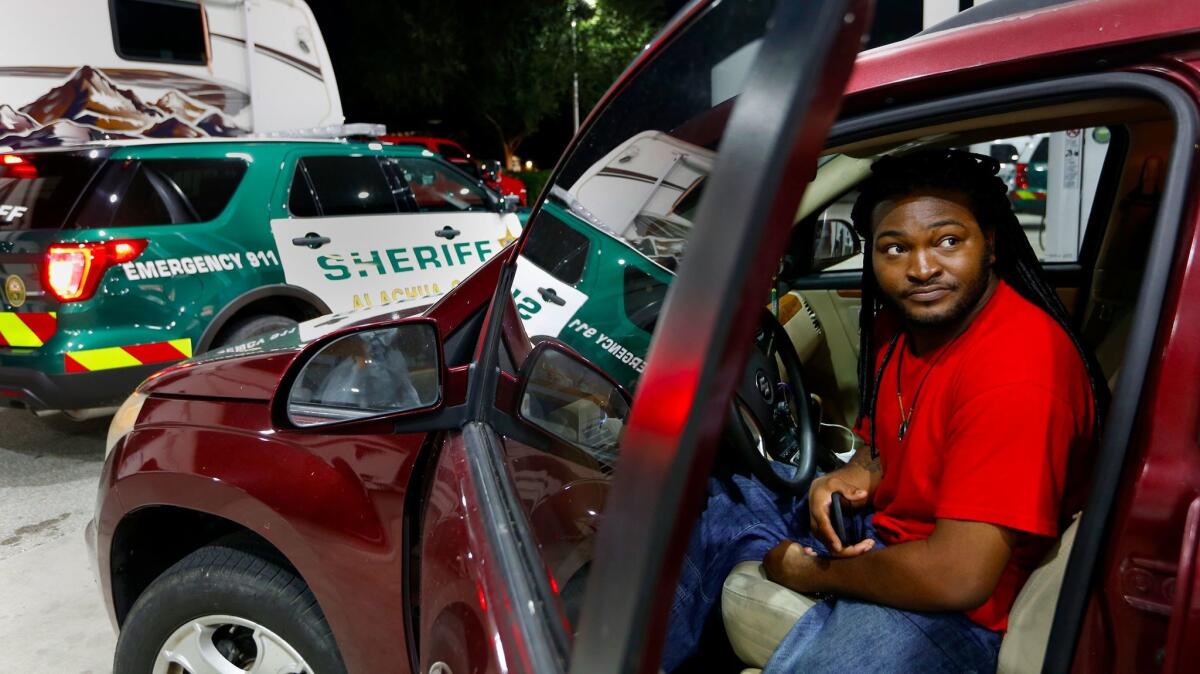
“We are just trying to get back,” said Rachel Monteagudo, who was hauling an oversized camper from Georgia back to Fort Lauderdale after fleeing the storm — but hadn’t seen any gas since she’d crossed the state line.
Hurricane Irma threw Florida into an epic gas crisis, turning the minor chore of filling up into what could feel like a fool’s errand. With ships unable to make deliveries through the storm and power outages forcing stations to close, up to 40% of the gas stations in the state were unable to provide fuel Tuesday, the online source GasBuddy reported.
As hundreds of thousands of evacuated Floridians motor back toward homes in areas ravaged by the hurricane, the hunt for gas has become a communal obsession.
People loiter at empty gas stations in the hope the situation might change. A car drives into an empty station and parks; soon a dozen more cars pile in, thinking the driver knew something they didn’t.
This happened at a Thornton’s filling station north of Tampa. An empty parking lot quickly came alive with chattering motorists hoping for gas. One motorist started pouring gas into her tank from big plastic containers. Nearby, a man had been snoozing in a jalopy he had aspirationally parked alongside a shuttered pump. Now he got out and approached the woman, wanting to know where she’d gotten the gas.
It turned out it had been pumped days before, at a station hundreds of miles away.
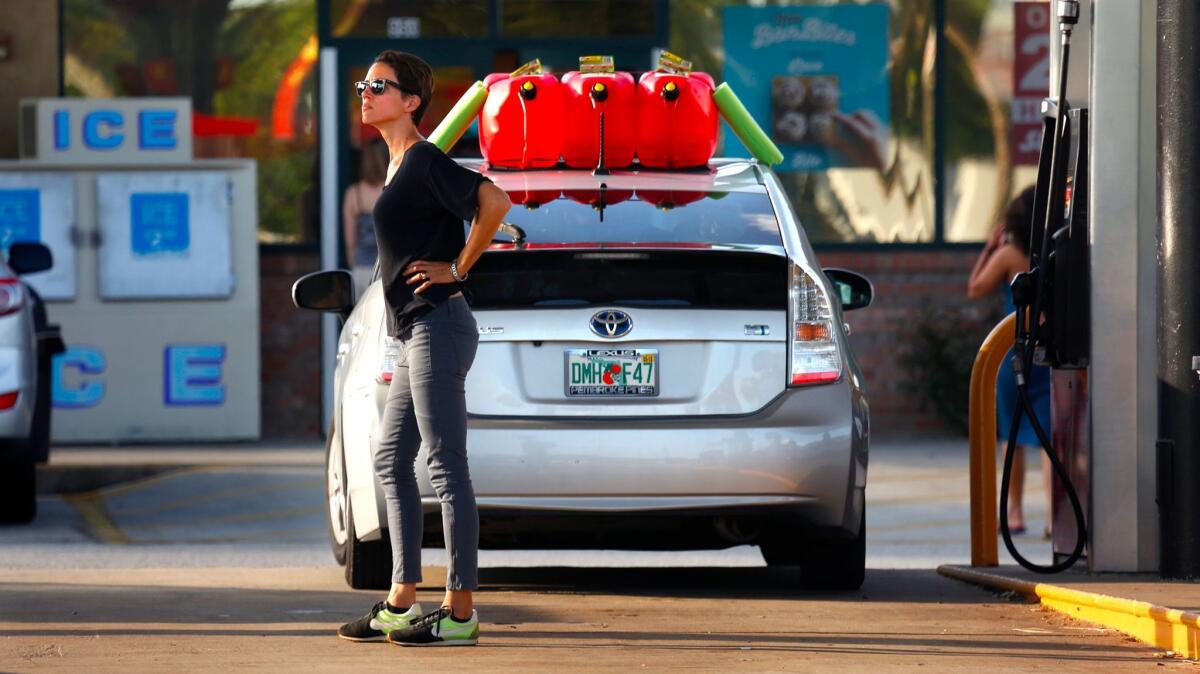
Some state ports where gas normally gets distributed are just now reopening. Regular gas refineries and supply lines disrupted by the wreckage Hurricane Harvey wrought last month in Texas are still recovering. And gas trucks were blocked for days making their way down the Florida coast as Irma passed through.
It all created a desperate situation up and down the state.
The one station that appeared to be open off I-75 north of Tampa on Monday night created chaos. A line down the exit ramp extended miles up the highway. Police lights glared by the intersection, with stressed officers trying to bring some order to the hordes of desperate drivers gridlocked at the filling station entrance.
The appearance of the gas line caused others to stop, setting off a chain reaction down the already clogged highway and bringing traffic to a near standstill for at least 15 miles.
Environmentalists have weighed in on TV, blaming the state’s heavy dependence on oil and pointing to how much less gas everyone would need had there been more hybrids on Florida interstates and fewer fuel-guzzling SUVs. SUV enthusiasts blamed environmentalists, complaining that their hostility to new oil pipelines worsened the shortages that choked Florida.
Often, motorists blamed one another.
When a couple of retirement age pulled up to a pump in Gainesville, they shot a look of incredulity and annoyance at a journalist who informed them there wasn’t a drop of gas in the station — or pretty much any station for the next 250 miles.
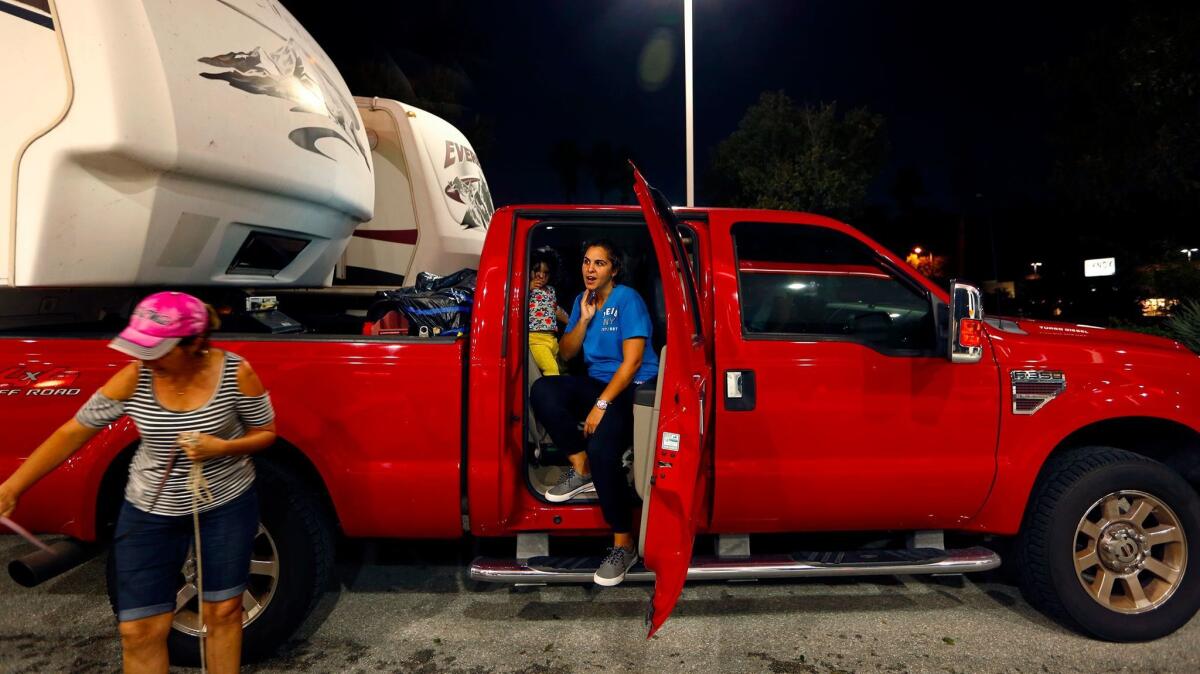
“I don’t believe what you are saying,” the man huffed, signaling his intention to get back in the car with its nearly empty tank and keep heading toward Venice, some 200 miles away. All he needed to do was get a few miles off the interstate, he insisted, and he would find something.
His companion’s face went pale.
Stocking up on gas has become so advisable that even gas cans are hard to come by. One station owner charged $66 for three empty plastic gas containers. A police officer watched as he rang up the sale.
“How do you live with yourself?” he asked the owner.
Gainesville was the most fuel-parched city in the state, according to GasBuddy, making it probably the most parched place in America, though it wasn’t clear why: The city made it through the storm in far better shape than other places that seemed to have more gas.
At one empty station in town, sheriff’s deputies in several squad cars congregated at an apparently empty gas station. Asked by a reporter why they were gathered at a gas station with no gas, one of the officers responded warily. “I have nothing to say about that,” he said.
Nearby, Devontshe Care sat in his car by one of the empty pumps, looking forlorn. The Key West resident trying to get home figured he had enough fuel to make it maybe 50 miles. He had a lot farther than that to go. He had seen some open stations pumping gas farther north, but the lines were long. He’d kept driving.
“I kept thinking, it’ll get a little better if I keep going,” he said. “It didn’t get better. Now I don’t know when I am going to make it back.” Care, a candy store manager, fiddled with his phone, looking for recent reports of gas nearby. There were none.
Gas was trickling back into the state by Tuesday, though even then, it took unwavering determination to get any of it.
Frederick Wilson, 66, set out on a desperate search near Georgetown, where the storm had wrecked the roof of his home and knocked out electricity. A borrowed generator kept the refrigerator running and emergency cellphones charged.
But the generator was out of gas. Wilson’s car was not far behind. Every gas station he went to was closed. He drove five miles, then 10. Nothing. At 15 miles, he said, “I got into a gas line, circa the 1970s,” referring to the long waits during the energy crisis of that decade. “I got up to the third in line. Then they ran out.”
He drove nervously on, his gas needle dropping.
Then, bingo: He saw a gas tanker pulled up at a station, and a fellow driver said fuel was about to flow. Wilson eagerly lined his own car up at the pump.
Presently, the driver of the tanker emerged from the convenience store, hopped in his cab and drove away. He didn’t have gas. He’d stopped for snacks.
Wilson finally found fuel at a Flying J off I-95, another 15 miles away. “Now I have to drive 30 miles back to my house,” he said.
Soon, he’d need more gas.
Follow me: @evanhalper
ALSO
Paradise has seen better days. The Florida Keys are battered, if not entirely bowed
These migrant workers earn $350 a week in the fields. Now Irma has destroyed their homes
Why didn’t Hurricane Irma kill more Americans? Thank the meteorologists
More to Read
Sign up for Essential California
The most important California stories and recommendations in your inbox every morning.
You may occasionally receive promotional content from the Los Angeles Times.

